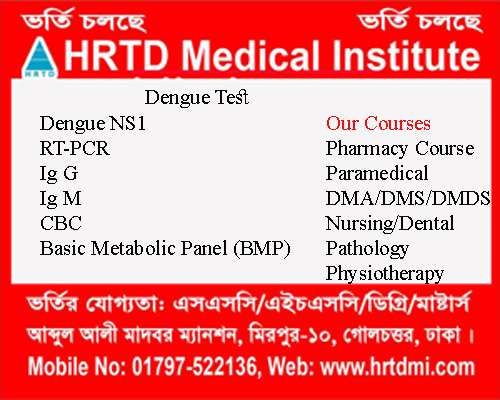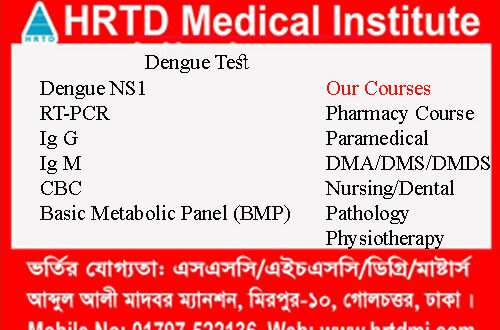Dengue Test. Mobile No. 01941123488. The dengue test is a common pathological test that is done for detecting dengue virus. This virus spreads from mosquitoes to people. Dengue Ns1, RT–PCR, IgG, IgM, CBC, Basic Metabolic Panel (BMP).

Dengue একটি ভাইরাসজনিত রোগ, যেটা এডিস মশার মাধ্যমে আক্রান্ত ব্যক্তি থেকে অন্য ব্যক্তির শরীরে ছড়িয়ে পড়ে। সাধারণত ৪-১০ দিনের মধ্যে এর উপসর্গ শরীরে স্পষ্ট হয়ে ওঠে। এ কারণে Dengue জ্বরে জটিলতাবেশি হয়ে থাকে।
Dengue এর লক্ষণ
Dengue সাধারণত দুই ধরনের-ক্লাসিক্যাল এবং হেমোরেজিক।সাধারণত Dengue হলে নিম্নলিখিত লক্ষণগুলো দেখা দেয়:
• Dengue জ্বরে সাধারণত প্রচণ্ড জ্বর এবং সেই সাথে হাড় ও শরীর ব্যথা থাকে।
• শরীরের তাপমাত্রা ১০৫ ডিগ্রি পর্যন্ত উঠতে এবং পারে ঘাম দিয়ে জ্বর ছেড়ে দিয়ে আবার জ্বর আসতে পারে।
• মাথা ব্যথা এবং চোখের পেছনে ব্যথা হয়।
• জ্বর হওয়ার ৪-৫ দিন পর শরীরে লালচে র্যাশ দেখা যায়।
• বার বার গলা শুকিয়ে যাওয়া এবং অত্যাধিক পানি পিপাসা।
• খাবারে অরুচি এবং এর সাথে বমি বমি ভাব, পাতলা পায়খানা, পেটে ব্যথা, মাঝে মাঝে খিচুনিও হতে পারে।
Dengue জ্বরে অনেক রোগীর রক্তের প্লাটিলেট কমে যাওয়ার আশঙ্কা দেখা দেয়, বুকে পেটে পানি আসে, যকৃত আক্রান্ত হওয়া, রক্তচাপ কমে যাওয়ার প্রবণতা দেখা যায়।
জ্বর হওয়ার কতদিনের মধ্যে কোন টেস্ট করলে Dengue ধরা পড়ে?
স্বাভাবিক জ্বর থেকে Dengue জ্বরের পার্থক্য টানতে চিকিৎসকরা শুধু শরীরে স্পষ্ট হয়ে ওঠা লক্ষণগুলোতেই নজর দেন না। কারণ অনেক সময় Dengue জ্বরে আক্রান্ত রোগীর শরীরে লক্ষণ স্পষ্ট হয় না। তাই Dengue নির্ণয়ে কিছু টেস্ট করাতে দেন চিকিৎসকরা।
Dengue জ্বর নির্ণয়ের একটি গুরুত্বপূর্ণ টেস্ট হলো Ns1। এই টেস্ট জ্বর হওয়ার সঙ্গে সঙ্গেই করলে টেস্টের রেজাল্ট ভুল আসে। তাই চিকিৎসকরা পরামর্শ দেন, টেস্টের রিপোর্ট যাতে শতভাগ নির্ভুলের জন্য জ্বরের ২ থেকে ৪ দিনের মধ্যে এ টেস্ট করতে হবে।
আবার ৪দিন ডেঙ্গু জ্বর পেরিয়ে গেলে এ পরিস্থিতিতে রোগীর Ns1 টেস্ট করা যাবে না। কারণ হিসেবে চিকিৎসকরা বলছেন, জ্বরের ৪ দিন পেরিয়ে যাওয়ার পর Ns1 টেস্ট ভুল আসে।
তাই রোগীর Dengue হয়েছে কিনা তা নিশ্চিত করতে ৫ থেকে ৭ দিনের মধ্যে IgG & IgM test করতে হবে ।
Dengue নিশ্চিত হলে উদ্বিগ্ন না হয়ে চিকিৎসা শুরু করতে হবে। রোগীকে পর্যাপ্ত বিশ্রাম, তরল খাবার ও জ্বর কমানোর জন্য প্যারাসিটামল খেতে দিন। Dengue জ্বরে প্লাটিলেট কমে গেলে তা ভয়ের কারণ নয়। খেয়াল রাখুন, রক্তের প্লাটিলেট ১০,০০০ এর নিচে নেমে গেলে এবং সেই সঙ্গে রক্তপাত হলে ডাক্তারের পরামর্শ অনুযায়ী রোগীর সেবা ও চিকিৎসা ব্যবস্থা নিশ্চিত করুন।
Training Center for Dengue tests
HRTD Medial Institute, Mirpur -10, Dhaka. Mobile o; 01941-123488
Dengue Ns1
NS1 Dengue test detects the non-structural protein(NS1) of dengue virus. This protein is secreted into the blood during dengue infection. This test was done by serum. The Ns1 Dengue test is very common and most popular in Bangladesh.
Interpretation of results
- A positive NS1 Dengue test result confirms dengue virus infection.
- A negative NS1 Dengue test result does not rule out infection.

Dengue Ns1 Antigen পরীক্ষার খরচ
Dengue Ns1 Antigen পরীক্ষার খরচ সরকারি হাসপাতালের জন্য ১০০ টাকা এবং বেসরকারি হাসপাতালের জন্য ৩০০ টাকা নির্ধারণ করে দিয়েছে সরকার |
Antibody Tests (IgM and IgG)
Antibody tests focus on detecting the antibodies generated by the immune system when an individual has encountered the dengue virus. These tests yield the best results when it is conducted at least four days following exposure. By analyzing the presence of specific antibodies, healthcare professionals can determine whether a person has been previously exposed to the virus, assisting in confirming the diagnosis.
Complete Blood Count (CBC)
The complete blood count test is employed to assess various cells and Cell components of the blood. One crucial aspect is the platelet count, which tends to decrease during the later stages of dengue fever. Monitoring platelet levels is essential as low platelet count can lead to bleeding complications. Additionally, the CBC helps identify changes in hemoglobin, hematocrit, and red blood cell count, indicating the presence of anemia, often associated with severe dengue fever.
 Pathology Training Institute in Bangladesh Best Pathology Training Institute in Bangladesh
Pathology Training Institute in Bangladesh Best Pathology Training Institute in Bangladesh


